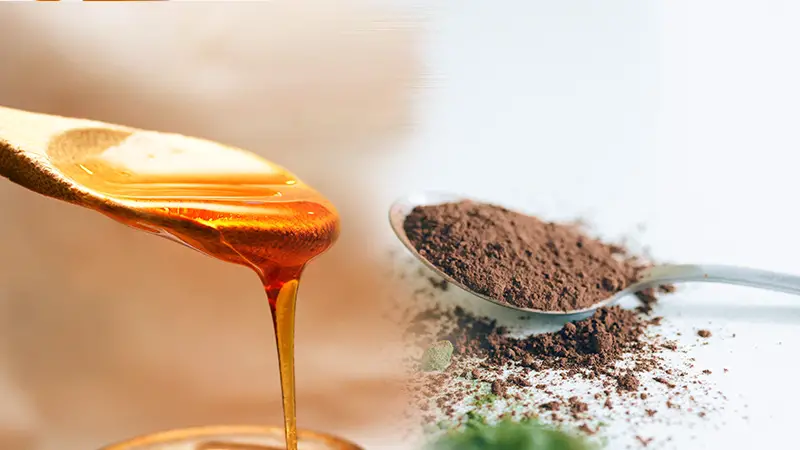The dietary choices of individuals with diabetes play a crucial role in managing their condition, and they often seek natural alternatives to sugar and sweeteners.
Two such options are honey and cinnamon, each renowned for its potential health benefits. However, there is a lingering question: can diabetics eat honey and cinnamon?
In this discussion, we explore the suitability of honey and cinnamon in the diets of individuals with diabetes. We delve into the potential impacts of these ingredients on blood sugar levels, their unique properties, and the considerations that must be taken into account.
This exploration aims to provide clarity on whether honey and cinnamon can be a part of a diabetic-friendly diet and how to use them responsibly to maximize potential benefits while minimizing risks.
Can Diabetics Eat Honey And Cinnamon?
Diabetics can consume honey and cinnamon in moderation as part of their diet, but it’s essential to be mindful of the quantities consumed and their potential effects on blood sugar levels.
Honey is a natural sweetener that has a lower glycemic index compared to table sugar, which means it may have a milder impact on blood sugar. However, it still contains carbohydrates, so it should be used sparingly, and its consumption should be factored into the daily carbohydrate allowance.
Cinnamon, on the other hand, is known for its potential to improve insulin sensitivity and reduce blood sugar levels. Some studies suggest that cinnamon may help with blood glucose control, making it a potentially beneficial spice for diabetics.
However, the effects can vary from person to person, and it should not be used as a substitute for prescribed diabetes medications.
While honey and cinnamon can be incorporated into a diabetic diet, it’s crucial for individuals with diabetes to consult with a healthcare provider or registered dietitian to determine the appropriate amounts and ensure they fit within their overall meal plan. Monitoring blood sugar levels and being aware of individual responses to these ingredients is also advisable.
Impact Of Honey And Cinnamon On Diabetes

Here’s some explanation on impact of honey and cinnamon on diabetes-
Moderate Blood Sugar Levels
Honey and cinnamon, when consumed in moderation, may help stabilize blood sugar levels. Some studies suggest that cinnamon can improve insulin sensitivity, assisting cells in using glucose more effectively, while honey’s natural sugars have a lower glycemic index, causing a slower increase in blood sugar.
Antioxidant Properties
Both honey and cinnamon are rich in antioxidants, which can help combat oxidative stress and inflammation in the body. Managing inflammation is particularly important for diabetics as it is linked to various diabetes-related complications.
Improved Insulin Sensitivity
Cinnamon contains bioactive compounds that mimic the effects of insulin, aiding in glucose uptake by cells. This enhanced insulin sensitivity can contribute to better blood sugar regulation for individuals with diabetes.
Potential Weight Management
Cinnamon is believed to play a role in controlling appetite and cravings, potentially assisting with weight management. Maintaining a healthy weight is crucial for diabetics as it can improve insulin sensitivity and overall glucose control.
Reduced LDL Cholesterol
Regular consumption of cinnamon has been associated with a decrease in LDL cholesterol levels, the “bad” cholesterol. Managing cholesterol levels is important for individuals with diabetes, as they are at higher risk of heart disease.
Anti-inflammatory Effects
Both honey and cinnamon possess anti-inflammatory properties, which can help reduce inflammation in the body. Chronic inflammation is linked to insulin resistance and other diabetes complications, making these properties beneficial for diabetics.
Gut Health Benefits
Honey, particularly raw honey, contains prebiotics that supports the growth of beneficial gut bacteria. A healthy gut microbiome is linked to improved metabolic health and better blood sugar control.
Potential Nerve Protection
Some studies suggest that compounds in cinnamon may protect nerves and improve nerve function. Diabetics are at risk of nerve damage (neuropathy), making this potential benefit significant for their overall health.
Natural Flavoring Alternative
Honey and cinnamon can enhance the flavor of diabetic-friendly foods without the need for excessive sugars or artificial sweeteners. Using them judiciously can make diabetic-friendly meals more enjoyable, encouraging adherence to a balanced diet.
While these impacts suggest potential benefits, individual responses can vary. It’s crucial for individuals with diabetes to consult healthcare providers or nutritionists before making significant changes to their diet, especially if incorporating honey and cinnamon for therapeutic purposes.
Monitoring blood sugar levels and adjusting their diabetes management plan accordingly is essential for overall health and well-being.
Recipes Of Honey And Cinnamon Diabetic Patients Can Consume

Here are some diabetes-friendly recipes incorporating honey and cinnamon:
Honey-Cinnamon Oatmeal
Start your day with a warm bowl of oatmeal. Cook rolled oats and add a drizzle of honey and a sprinkle of cinnamon. Top with fresh berries and chopped nuts for added fiber and protein.
Oats have a low glycemic index and, combined with honey and cinnamon, make a satisfying and nutritious breakfast.
Cinnamon-Spiced Greek Yogurt
Mix Greek yogurt with a dash of cinnamon and a touch of honey for a delightful and protein-packed snack or breakfast. Top with chopped almonds and a few fresh apple slices for extra crunch and flavor.
Honey-Cinnamon Glazed Carrots
Roast carrot sticks with honey and cinnamon glaze for a sweet and savory side dish. This recipe offers a healthier alternative to sugary side dishes while providing the benefits of carrots’ low glycemic index and fiber.
Cinnamon-Spiced Baked Apples
Slice apples and sprinkle them with cinnamon and a drizzle of honey. Bake until tender. This dessert is a nutritious and low-sugar option, and the cinnamon may help stabilize blood sugar levels.
Honey-Cinnamon Grilled Chicken
Marinate chicken breasts in a mixture of honey, cinnamon, and a splash of olive oil, then grill for a flavorful and protein-rich main course. The honey and cinnamon provide a unique taste without excessive sugars.
Cinnamon-Infused Quinoa Salad
Cook quinoa and season it with a pinch of cinnamon, then toss with fresh vegetables, chopped nuts, and a honey vinaigrette. Quinoa’s low glycemic index and the additional nutrients make it an excellent choice for diabetics.
Honey-Cinnamon Almond Butter Spread
Mix almond butter with a drizzle of honey and a touch of cinnamon for a delicious and fiber-rich spread. Enjoy it on whole-grain toast, rice cakes, or as a dip for apple slices.
The healthy fats and fiber in almonds provide sustained energy and help maintain stable blood sugar levels.
These recipes offer flavorful ways for diabetic patients to enjoy the benefits of honey and cinnamon while adhering to a balanced, blood sugar-friendly diet.
It’s important to use honey and cinnamon judiciously and monitor blood sugar levels to ensure they fit within individual dietary plans. Consultation with a healthcare provider or dietitian is advised for personalized guidance on dietary choices.
Some Beneficial Ways To Use Honey And Cinnamon For Diabetics

Using honey and cinnamon judiciously can offer several benefits for individuals with diabetes.
Here are some ways to use these ingredients to enhance your diabetic-friendly diet:
Blood Sugar Regulation
Incorporating honey and cinnamon can potentially help regulate blood sugar levels. Cinnamon, in particular, may improve insulin sensitivity, aiding in better glucose control.
Sugar Replacement
Both honey and cinnamon can serve as natural sweeteners that are lower on the glycemic index than traditional sugar. This allows diabetics to satisfy their sweet cravings without causing drastic spikes in blood sugar.
Flavorful Teas and Beverages
A dash of cinnamon and a touch of honey can enhance the flavor of herbal teas or warm water. Cinnamon-spiced beverages are not only comforting but may also support blood sugar management.
Oatmeal and Cereal Enhancement
Sprinkle cinnamon and a drizzle of honey on your oatmeal or whole-grain cereal. This adds a delightful, natural sweetness and can help stabilize your blood sugar throughout the day.
Marinades and Salad Dressings
Create marinades and salad dressings using honey and cinnamon. These can add a unique flavor to your dishes, making your meals more enjoyable without using excessive sugar or high-glycemic condiments.
Dessert Toppings
Enhance your desserts with a sprinkle of cinnamon and a drizzle of honey. Opt for healthier dessert options like baked apples or Greek yogurt parfaits, and use these ingredients to sweeten your treats naturally.
Nutrient-rich Snacks
Combine honey and cinnamon with nutrient-rich foods like almonds or walnuts. These homemade snacks provide healthy fats, protein, and fiber, making them excellent choices for between-meal munching.
Using honey and cinnamon in these ways allows diabetics to enjoy the taste while being mindful of their blood sugar management.
However, portion control is key, and it’s important to monitor individual responses and consult with a healthcare provider or dietitian to ensure that these ingredients align with your specific dietary needs.
FAQs
Can diabetics include honey in their diet?
Yes, diabetics can consume honey, but it should be done in moderation. Honey is a natural sweetener with a lower glycemic index than table sugar, which means it can have a milder impact on blood sugar levels.
However, it still contains carbohydrates, so it should be factored into your daily carbohydrate allowance.
Is cinnamon safe for diabetics?
Cinnamon is generally considered safe for diabetics and may offer some benefits. Some studies suggest that cinnamon can improve insulin sensitivity, potentially helping to regulate blood sugar levels.
However, it should be used as a supplement to diabetes management and not a substitute for prescribed medications or dietary recommendations.
How should diabetics use honey and cinnamon in their diet?
Diabetics should use honey and cinnamon judiciously. They can be added to foods like oatmeal, yogurt, and herbal teas to enhance flavor. When used in recipes, they can be included as natural sweeteners. Portion control is key to avoiding excessive sugar intake.
Can honey and cinnamon help lower blood sugar levels for diabetics?
While some studies suggest that cinnamon may have a positive effect on blood sugar regulation, the impact can vary among individuals. Honey, with its lower glycemic index, may help prevent rapid spikes in blood sugar.
However, the effects are not consistent for everyone, and individual responses should be monitored.
What are the potential risks of consuming honey and cinnamon for diabetics?
The potential risks of consuming honey and cinnamon for diabetics include overconsumption, which can lead to elevated blood sugar levels. Additionally, some people may be allergic to honey.
Conclusion
The consumption of honey and cinnamon by individuals with diabetes is feasible but should be approached with caution and moderation. Both ingredients have attributes that can positively influence blood sugar control and overall health.
Cinnamon may improve insulin sensitivity, while honey has a lower glycemic index than table sugar. However, it’s crucial for diabetics to use these ingredients sparingly and to monitor their individual responses, as the effects can vary among individuals.
Consultation with a healthcare provider or registered dietitian is advisable to determine the best way to incorporate honey and cinnamon into a diabetes management plan.
By doing so, diabetics can enjoy the potential benefits of these natural alternatives while effectively managing their blood sugar levels and overall well-being.
Hi, I’m Mark Pattinson and I’m a freelance personal trainer. I’ve been working in the fitness industry for over 10 years especially since I work with diabetes patients and I love helping people achieve their fitness goals. I believe that everyone can benefit from a good workout, and I’ll do everything to make sure you get the most out of your training.